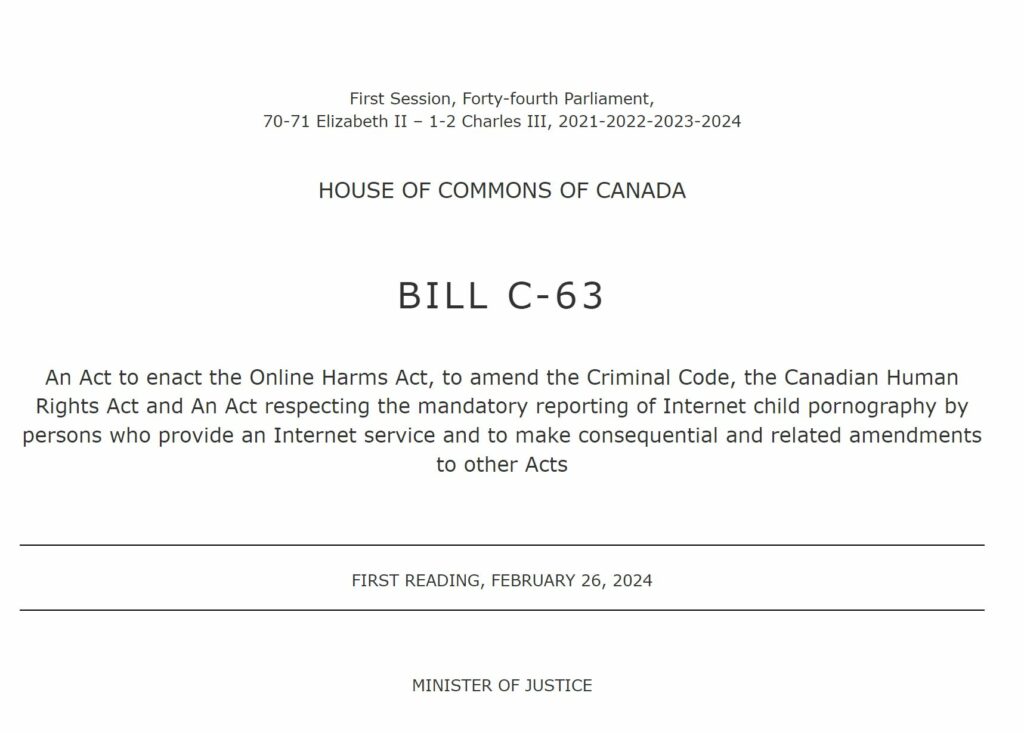What you need to know about the Online Harms Bill (C-63)
Stephanie has been hearing from constituents very concerned about this piece of government legislation.
She and her Conservative colleagues agree.
After their first attempt to combat harmful online content was heavily criticized by experts as flawed, the Liberals are trying again. However C-63, introduced in the House of Commons on February 26th, 2024, contains significant threats to both freedom of speech/expression and due process.
 Click image to read text of Bill C-63
Click image to read text of Bill C-63
Essentially, they have created legislation focussed on two different issues – an online harms portion intended to offer protection to minors (for digital acts such as cyberbullying and revenge porn) and a second section which will increase criminal sanctions on hate speech (already covered under the Criminal Code).
Whether the first part will accomplish it’s stated goals will continue to be debated in the House and the Senate, and their respective Committees, over the coming days and weeks.
It is the second part of C-63 which contains the most worrisome content.
The Liberals propose to increase the maximum sentence for hate speech (which already carries a sentence of five years under the Criminal Code) to life, which would place it among the most serious offences, such as manslaughter and aggravated sexual assault, which also carry life sentences. This could effectively result in someone being sentenced to life for hate speech, while someone convicted of a sexual assault of a minor can receive a maximum of only 14 years, and an individual found guilty of assault with a weapon a maximum of ten years.
And that is just the start. As the Globe and Mail explained, “The bill also proposes that anyone who breaks any other federal law ‘motivated by hate’ be found guilty of a hate crime, and subject to a maximum life sentence. To be clear: that provision is not limited just to the Criminal Code; all federal statutes are included.
That overreach is bizarre enough that it may be down to simple sloppiness. Much more worrisome, however, is the mechanism that the Liberals have set up that will allow for peace bonds, including house arrest, to be sworn out against individuals who may, someone believes, break the hate-speech law at some point in the future.”
And who will be overseeing this monitoring of communication? A group of three to five appointed officials who will comprise the new Digital Safety Commission of Canada, the CEO of which will have the status of a head of a department and the Commission will have the power of a federal court (although it will not be bound by any “legal of technical rules of evidence”).
The fact that hatred is defined in C-63 as an “emotion” is a significant red flag. Who is defining that emotion?
As the National Post revealed, Another serious provision is that you could be denounced by anyone as being a probable future offender – based only on their “fears”. The implications of that pre-crime accusation are incredible as Jordan Peterson summarizes in his Post article:
“Under the ‘hate crime’ provisions, you can and will be brought before a provincial court, which can deem you a probable offender — someone likely to generate ‘hate propaganda or hate crime.’ You can and will then be outfitted not only with an ankle bracelet (!), restricted in your movement to your house (!), and barred from communicating in any manner with whomsoever the commission or court specifies, but will also be rendered subject to the mandatory monitoring of your bodily fluids, on the off chance that you take a drink or smoke, say, a joint, so that your mouth might be loosened (although no reason for such invasive surveillance is given in the legislation)….
“This is a bill that is both stunningly dangerous and appallingly lazy. It is stunningly dangerous because it produces a free-speech policing and court enterprise with an unlimited purview — one that can and will be immediately weaponized for political reasons (as the commission can consider any factor it deems “relevant”). It is appalling and unforgivably lazy because although the bill purports to deal with online harm it fails to consider any such harm with any degree of seriousness in analysis or with regard to rectification. It does not deal seriously with the problem of online sexual exploitation…
“Bill C-63 is an act of authoritarian overreach the likes of which has never been seen in this country, or anywhere else in the democratic west. Crime and pre-crime — alleged by the anonymous, and punished by the unaccountable.”
-Dr. Jordan B. Peterson
Certainly the Official Opposition believes that we should criminalize and enforce laws against: sexually victimizing a child or revictimizing a survivor online;
bullying a child online; and
inducing a child to harm themselves or inciting violence.
Additionally, criminal bans on intimate content communicated without consent – including deepfakes – must be enforced and expanded.
However we do not believe that the government should be in charge of policing, banning and criminalizing opinions. Common sense Conservatives will protect our kids and punish criminals instead of creating more bureaucracy and censoring points of view.